 Joe Biel, the sole founder of Microcosm, is autistic but was not diagnosed until he was 32 years old. As a result of this, we, the staff of Microcosm are constantly barraged with questions about this situation. He removed himself from Microcosm’s management in November 2010 to get a better handle on managing his social interactions and did not return to manage the company until August of 2012. People frequently ask about the confusing developments at Microcosm since we published our You Can Work Any 100 Hours Per Week zine in 2006. The internet, if it’s anything, is a confusing place to get clear and reliable information where you have to navigate innumerable biases, so putting Joe’s story forward to be found seemed like a good idea:
Joe Biel, the sole founder of Microcosm, is autistic but was not diagnosed until he was 32 years old. As a result of this, we, the staff of Microcosm are constantly barraged with questions about this situation. He removed himself from Microcosm’s management in November 2010 to get a better handle on managing his social interactions and did not return to manage the company until August of 2012. People frequently ask about the confusing developments at Microcosm since we published our You Can Work Any 100 Hours Per Week zine in 2006. The internet, if it’s anything, is a confusing place to get clear and reliable information where you have to navigate innumerable biases, so putting Joe’s story forward to be found seemed like a good idea:
On a rainy day in early 2006, I converted Microcosm from traditional top-down management to be managed by a collective. The staff was not pressuring me to do so, but managing other people was stressing me out something fierce and this seemed like a good way to reduce my own stress load while doing what was “right” politically. I had been raised on didactic politics and because we could only pay minimum wage and asked a lot of people, it seemed like a reasonable and fair thing to do. Unfortunately, it immediately created a slew of greater problems. No one had been on board for ten years like I had, so most people weren’t invested in the same way. I was young and unreasonably optimistic. There weren’t good teaching systems, structures, policies, expectations, and clear historical, organizational, and cultural understandings in place for what people were expected to do. And that was partly my fault.We were constantly negotiating everyone’s feelings. Whoever had the strongest personality would determine management policies by simply being the loudest voice, imposing their views on others.
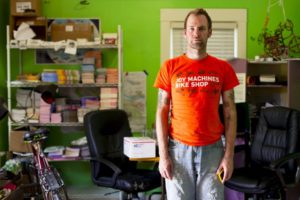 After being involved in the many various incarnations of Microcosm over the past nineteen years, my tastes and interests changed and sometimes weren’t in sync with the scene’s, the Microcosm collective’s, the organization itself, or the sort of cultural groupthink that was happening around us. One major problem of creating something as a teenager without much forethought is that we were progressively aging out of the youth culture that our fans existed in; the organization couldn’t evolve as fast as it needed to for my own interest. So at various points where I felt particularly out of sync, I would disinvest from Microcosm and try to give other people more room in their vision of how to shape it.
After being involved in the many various incarnations of Microcosm over the past nineteen years, my tastes and interests changed and sometimes weren’t in sync with the scene’s, the Microcosm collective’s, the organization itself, or the sort of cultural groupthink that was happening around us. One major problem of creating something as a teenager without much forethought is that we were progressively aging out of the youth culture that our fans existed in; the organization couldn’t evolve as fast as it needed to for my own interest. So at various points where I felt particularly out of sync, I would disinvest from Microcosm and try to give other people more room in their vision of how to shape it.
A staff person would say “why don’t we publish this book?” and when we did it was a break from the intentionality of a clear and planned flow of releases and we’d increasingly end up with a storage room full of various unsold books, a problem we’d never had before. Many people came in with different understandings of what Microcosm was and with their own ideas about how it should change, which led to a sort of internal “reinventing” and personality clashes every year or more. I was frequently having to reject submissions that I knew would sell because of the way the conversation had gone within management. Several authors expressed to me that they were told by virtually all members of the collective, “I really liked it but the collective didn’t, so I’m afraid we’re going to have to pass.” I know how rejection feels but this made us look both disorganized and impersonal, and it made it appear like a political rejection or to feel like you were kicked out of the cool kids’ club.
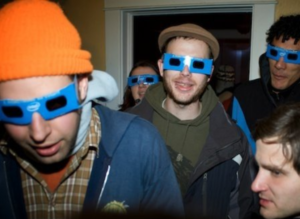 Also starting in 2006, before the bulk of our warehousing was handled by Independent Publisher’s Group, Microcosm set out on an ongoing quest to find affordable warehousing for the volume of publishing it was doing inside inner-Portland. Unable to do so, we instead setup a mail-order and warehouse location in Bloomington, IN in March 2007. This confused a lot of people, who felt that we had “moved out of Portland” even though we still had people and a presence there. Nonetheless, I think people took it as the first “betrayal.” Our fans felt ownership over Microcosm, which made hard decisions even more difficult. Other staff, who interpreted this as a free invitation to move wherever they wanted and keep their jobs, setup an office for promotions in Lansing, Kansas in 2011. Further, due to complications of communication and managing across state lines, all three locations become somewhat fractured from each other and developed tension. Conversations about the simplest things became overly complicated. The overworked staff were frustrated with each other due to distance and perception.The decisions that management was making were causing wages to sink lower each year.
Also starting in 2006, before the bulk of our warehousing was handled by Independent Publisher’s Group, Microcosm set out on an ongoing quest to find affordable warehousing for the volume of publishing it was doing inside inner-Portland. Unable to do so, we instead setup a mail-order and warehouse location in Bloomington, IN in March 2007. This confused a lot of people, who felt that we had “moved out of Portland” even though we still had people and a presence there. Nonetheless, I think people took it as the first “betrayal.” Our fans felt ownership over Microcosm, which made hard decisions even more difficult. Other staff, who interpreted this as a free invitation to move wherever they wanted and keep their jobs, setup an office for promotions in Lansing, Kansas in 2011. Further, due to complications of communication and managing across state lines, all three locations become somewhat fractured from each other and developed tension. Conversations about the simplest things became overly complicated. The overworked staff were frustrated with each other due to distance and perception.The decisions that management was making were causing wages to sink lower each year.
Because we had multiple locations with multiple offices in multiple states, the loudest personalities could still determine management policies by simply refusing to back down.Despite being supposed equals, people were having frequent miscommunications across state lines and attempts at speaking up about this was increasingly futile, even as things moved into absurdity. One person spent their healthcare stipend on a carton of cigarettes. Staff who weren’t working in the same office with the loudest personalities frequently expressed feeling dictated to and managed.
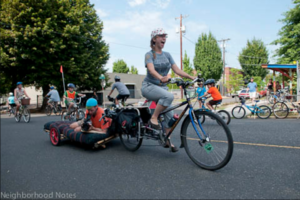 Simultaneously, there was understandable friction that I got the credit when we did something right, even if I had little to do with it. People wanted to interview me, rather than the collective. So there were increasing efforts to make it appear like more of a semi-anonymous group that projected an amorphous image. And I think to the public, it created a lot of confusion because we didn’t seem to act consistently or with forethought. Instead of pursuing a vision we were following watered-down decision making: Actions were taken once a decision was shaped to no longer be objectionable to any member of the collective, rather than making planned out choices set out to achieve specific goals.
Simultaneously, there was understandable friction that I got the credit when we did something right, even if I had little to do with it. People wanted to interview me, rather than the collective. So there were increasing efforts to make it appear like more of a semi-anonymous group that projected an amorphous image. And I think to the public, it created a lot of confusion because we didn’t seem to act consistently or with forethought. Instead of pursuing a vision we were following watered-down decision making: Actions were taken once a decision was shaped to no longer be objectionable to any member of the collective, rather than making planned out choices set out to achieve specific goals.
Six years as a collective later, Microcosm had spent its entire $40,000 savings and was $37,000 in debt. I removed myself from management and later quit as a result. The collective management of the previous six years had agreed to pay for half of the debt but weren’t paying.
We trudged along on my personal credit cards with people coming and going fast enough that few managers/collective members really understood the gravity of the situation and thought that we always existed in crisis. And everyone has their own weird little unresolved personality issues to play out that they hadn’t quite shed, including me.
Simultaneously, my ex-wife, who had also been an employee until she quit in October of 2006, accused me very publicly of abusing her in our relationship that ended in 2004, in a moment culminated by me being a jerk about spilling ice cream on our couch, having trouble with her drinking habits while I was needing to quit, and a large backlog of self-described “little things.” By being vague and using terms like “emotional abuse,” there was further confusion about what actually went on in our relationship and people related it to the worst things that they had suffered, tending to assume I was responsible for things like physical violence or rape. While I think her pain was real, I’ve done everything that was asked of me to resolve the situation, and have acknowledged that many times over. Rumors and misinformation about what was said or asked of me, and how I had cooperated or not, literally ripped apart the scene. And it spiraled out of control, making everyone involved crazier in the end, and not seeming to make anyone feel better.
I looked up “abuse” and found: “to treat a person with callous indifference or pleasure in causing pain and suffering, especially regularly or repeatedly.” Before I understood the emotional needs of others, I was repeatedly insensitive and callous towards their feelings, hurting people that felt close to me in deep, fundamental ways. I took no pleasure in this. I was confused each time that it happened and ultimately it hurt me too; I cared about these people and wanted emotional proximity with them but had no understanding of how to achieve that. Still, my actions that hurt them. I emotionally abused people that I care about. Taking responsibility for the impact of my actions was the first step towards moving on. I focused on learning how to prevent it from continuing.
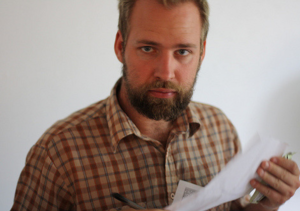 I did respond to and comply with 20 demands made of me and, as requested, found “professional counseling (with someone who is not your friend) to deal with your past family issues as well as issues of control, abuse, and manipulation.” I spent four years in therapy, twice per week, at the request of my ex because a student therapist suggested our relationship might have been abusive. Over the course of those years in therapy, evaluating my behaviors and unpacking the baggage of the history of my life, I had a very good experience of resolving a lot of old things, some I wasn’t aware of and some that had long been plaguing me, about ways I was raised and treated. It was, overall, a very good experience for me and I’m glad that I did it, even though it did not lead to resolution with my ex. But the real shocker was that after all that time, my therapist told me that while she did not feel that I had an abusive personality, I did have demonstrated issues with understanding people’s expressed boundaries, which ended up revealing much bigger revelations about my brain neurology that had not been noticed as a child. It was a major revelation in my life and the key to understanding so many mysterious and painful events of my past.
I did respond to and comply with 20 demands made of me and, as requested, found “professional counseling (with someone who is not your friend) to deal with your past family issues as well as issues of control, abuse, and manipulation.” I spent four years in therapy, twice per week, at the request of my ex because a student therapist suggested our relationship might have been abusive. Over the course of those years in therapy, evaluating my behaviors and unpacking the baggage of the history of my life, I had a very good experience of resolving a lot of old things, some I wasn’t aware of and some that had long been plaguing me, about ways I was raised and treated. It was, overall, a very good experience for me and I’m glad that I did it, even though it did not lead to resolution with my ex. But the real shocker was that after all that time, my therapist told me that while she did not feel that I had an abusive personality, I did have demonstrated issues with understanding people’s expressed boundaries, which ended up revealing much bigger revelations about my brain neurology that had not been noticed as a child. It was a major revelation in my life and the key to understanding so many mysterious and painful events of my past.
As requested, I made a public statement and apology in June of 2009 and several follow-ups to it. Also as requested, the collective made individual statements to Cindy Crabb in 2010 and two group statements in 2011. Further, I engaged with Cindy in an effort to create healing in what is called an accountability process, but lacking proper norms, expectations, and structures for how they are conducted, and having very low success rates, this particular one was further derailed due to being performed completely through a series of interstate emails. This kind of communication was not very suited for demonstrating understanding of complex subjects and creating the kind of emotional proximity and trust that would be required for something like this to work.
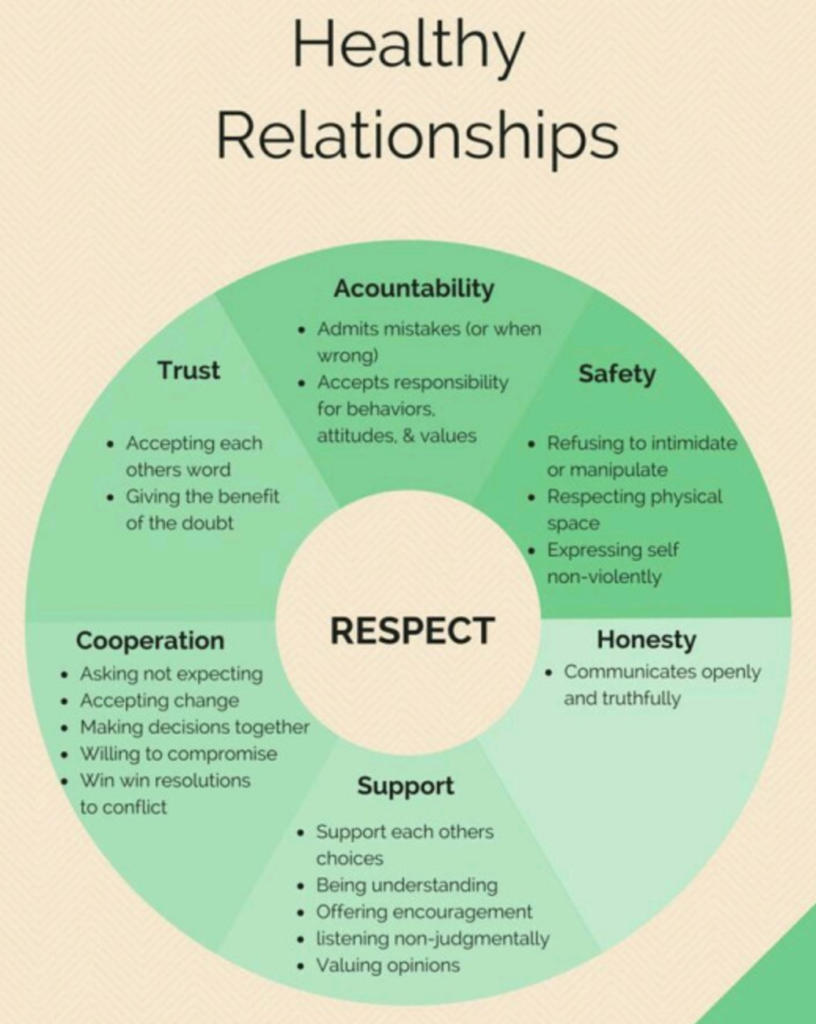 Mediation was further attempted by other individuals but once people saw that the situation was complex and not just black and white, they would back away and say they didn’t have time to deal with it, creating more chaos and rumors. Unfortunately, the vast majority of questions from people following the situation have been bullying, yelled, insulting, and assumptive.They began to destroy our morale. It’s been nearly eleven years since my ex and I separated, but to each person who learns about the situation, it’s like an open wound festering with each new rumor and attempt to resolve the situation.
Mediation was further attempted by other individuals but once people saw that the situation was complex and not just black and white, they would back away and say they didn’t have time to deal with it, creating more chaos and rumors. Unfortunately, the vast majority of questions from people following the situation have been bullying, yelled, insulting, and assumptive.They began to destroy our morale. It’s been nearly eleven years since my ex and I separated, but to each person who learns about the situation, it’s like an open wound festering with each new rumor and attempt to resolve the situation.
I grew up with a lot of “scene damage” and so when a dozen people I trusted and cared about—albeit most of them knowing little about the specifics of the situation—begin to make demands of me and tell me that contrary to professional opinions, that I am “an abuser” and that my therapist is “not a feminist” when she tells me otherwise, I began to believe it all. Fortunately, around the same time I came to develop a social circle of adults who weren’t involved in the scene and began asking me questions about it and helping to approach the situation in an objective manner. Instead of condemning me, these questions began to help me understand the situation and the way a didactic approach and a mob mentality does not move towards healing. (http://towardfreedom.com/29-archives/activism/3455-the-politics-of-denunciation)
I began to understand the most complicated nuances of all: A person could experience abuse based on their life experiences and how they had been treated before in damaging ways. A person could experience abuse from someone who happened to hit upon their insecurities, however well-meaning. Two people that communicate very poorly could simulate the dynamics of an abusive relationship by failing to understand each other’s statements, motives, feelings, and needs. And the building resentment, hurt, and pain is all very real—intentional or not. And no imposed demands serve to actually heal anyone’s feelings. It just creates more hurt and room for misunderstanding.
Many years ago, I had been involved in the accountability processes of other people and the dynamics that frustrated me so much through other people’s processes are now crystal clear: There is no path towards resolution. As each thing was completed that was asked of me, my friends, my partner, my business, my co-workers, etc, more and more things were simply asked for, and when I asked about clarity, I was told that I should not expect the process or cooperation to resolve the problem, that that was not other people’s agenda or responsibility. And fair enough, but that should have been communicated in the first place and how does a person and a community move forward from such a scar if that isn’t part of the plan and agenda? And that seems to be why people seem to “give up” and splinter off into a different vacuum as an accountability process inevitably fails to comfort people and create resolution.
The modern variation of Gene Sharp’s popular 1968 leftist tactics of “Ostracism of persons” and brigading, or targeting specific subjects for collective harassment and threats, bear remarkable similarity to that of fascist hate speechist Milo Yiannopoulos. It’s just a different kind of violence, even if it’s isolating people away from their communities and doing financial and interpersonal harm.
Feeling unsuccessful, the same public eventually took a new tactic of trying to put pressure on my co-workers to make me do unspecified things or at least kick me out of the collective. That threw the people at Microcosm into a new flurry to “prove” that they did take these issues seriously. Why it was assumed that they didn’t take these issues seriously already, I’ll never know. They did each thing that was asked of them but yet the meme was repeated that they did not and were, in fact, supportive of abuse. And aside from these being some of the people I care about most in the world, the situation was very upsetting because the staff was bending over backwards to cooperate at a time when they were needed to work more and more hours and manage more and more stress and mess.
 Simultaneously, my experience and vision could be frustrating and intimidating to people at work who had less of either and desperately wanted to be equals or simply had incompatible visions with the other staff. The whole thing was stressing us all out something fierce.From all points, the staff was really burnt out on it and our fans were bringing the conflict they perceived up to the staff—mostly Jessie—for so many years that it just caused the staff shut to down for awhile. I was fed up and began my exit strategy.
Simultaneously, my experience and vision could be frustrating and intimidating to people at work who had less of either and desperately wanted to be equals or simply had incompatible visions with the other staff. The whole thing was stressing us all out something fierce.From all points, the staff was really burnt out on it and our fans were bringing the conflict they perceived up to the staff—mostly Jessie—for so many years that it just caused the staff shut to down for awhile. I was fed up and began my exit strategy.
We had very tense all staff meetings in Bloomington in 2009 and 2010 where the entire staff was on the verge of throwing in the towel. Afterwards, several people quit and others lost their collective status due to working insufficient hours or because of repeated policy violations. I took a leave of absence from management immediately afterwards in 2010 to give people some space, get some stress relief, let people direct the future of the organization, and work on a new feature film, Aftermass: Bicycling in a Post-Critical Mass Portland. But I was deeply intertwined, the organization was still lacking cashflow so it was being run on my personal credit cards, and dissolving the relationship wasn’t so simple as walking away. Operations seemed to be getting increasingly disorganized and the mail-order was painfully behind.
Lansing-manager Jessie Duke, a Microcosm employee since 2005, was the first person to take up the option to purchase company ownership as a way to appease the critics in 2010. She began running the whole company in 2011 and her and I created an agreement that she would buy out my remaining 50% ownership in 2012. But in the meantime other staffers began insisting that ownership should have no value and she got cold feet about the risk. She has two small children and things had slowly been going downhill since she started (financially, morale, size of staff, etc).
Trying to find a good solution and finding herself as one of three remaining collective managers, Jessie made the decision to close the Bloomington location completely in July of 2011 and move those operations to Lansing, KS. She also unceremoniously fired Sparky Taylor, who created further public outcry, complaining about our organizational culture. These criticisms were founded reasonably on being worked hard for low pay. Expectations and feelings became the commodities that the staff dealt in instead, creating tremendous ups and downs, but mostly disappointments. Eventually Jessie streamlined the mail-order, with the idea that others would buy out the rest of my ownership and figure out a way to develop their own line of credit. I continued to disinvest.
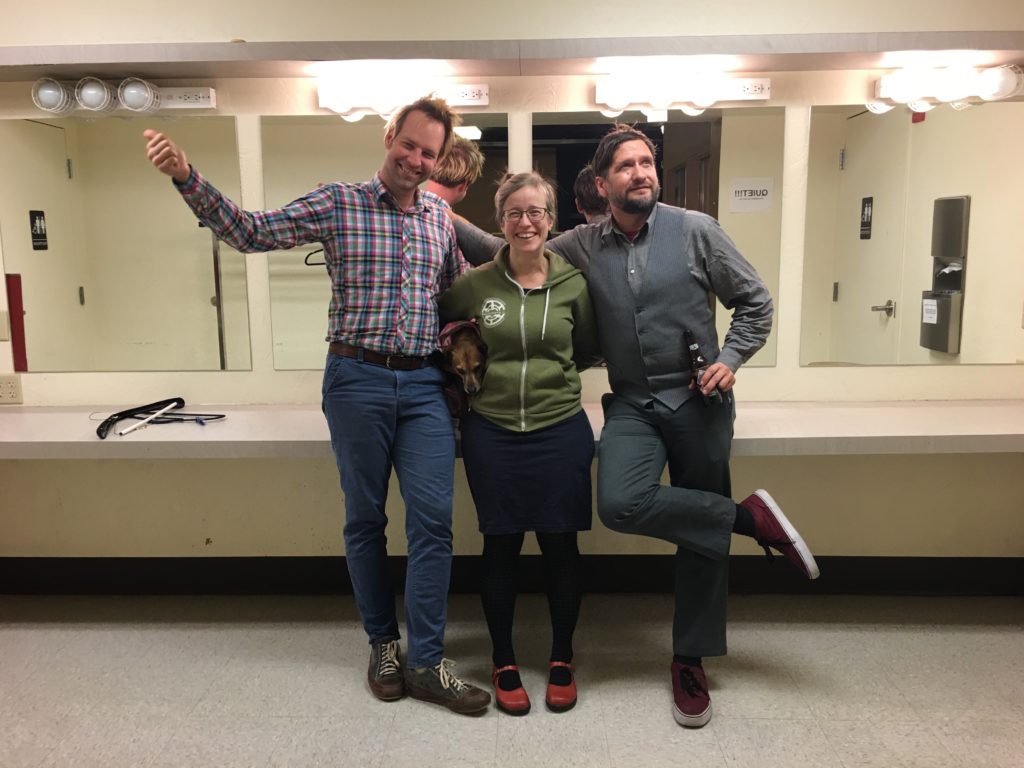 I created a new press called Cantankerous and started having successes with things outside of Microcosm, which was certainly a wake-up call. We built a touring package that I’m really proud of with my partner Elly Blue and chef Joshua Ploeg where we go to your town, Joshua makes seven courses for everyone, and we have movies and presentations about cycling that teach you things like how cyclists pay more than their share of road taxes while motorists pay about 1/11 of their cost to society. It was one of the most successful tours we had done so we kept doing it as I continually disinvested from Microcosm.
I created a new press called Cantankerous and started having successes with things outside of Microcosm, which was certainly a wake-up call. We built a touring package that I’m really proud of with my partner Elly Blue and chef Joshua Ploeg where we go to your town, Joshua makes seven courses for everyone, and we have movies and presentations about cycling that teach you things like how cyclists pay more than their share of road taxes while motorists pay about 1/11 of their cost to society. It was one of the most successful tours we had done so we kept doing it as I continually disinvested from Microcosm.
Microcosm couldn’t afford its staff anymore so when people quit they couldn’t be replaced and everyone was simply doing more work. I was casually working part time and had removed myself from collective management. I think at some point management just stopped happening and everyone just kept doing their jobs, to their individual level of commitment. Things were falling apart at the seams. Jessie told me that she was having a second son and could not stomach the risk of buying out the remainder of my ownership herself. Other staff felt that funding the launch of the company and growing and running it for the first ten years had no monetary value and that I should walk away with nothing from it.
By 2012, when I came back from two years of managerial leave after quitting, the traumatic events were eight years behind me, I had cooperated with accountability, was doing or had finished the 20 things asked of me, and completed my massive soul searching mission, had been in a happy and healthy relationship for four years, and I was just happy to have a personal life again where I wasn’t continually being asked about my private relationships.
We were still based in two different offices in Portland and Kansas and I had proposed splitting Publishing + Distribution into two autonomous organizations back in our meeting in 2010 just before I took a leave. But the collective turned down the notion. Jessie picked up this idea again in June of 2012 and suggested that since no one else was interested in ownership and rather than her taking the continued risk of buying out the remaining ownership, we could literally split into two separate organizations and work internally in our own offices with our own management. It was something I had long dismissed as outside of the realm of possibility: A solution that left the entire remaining staff happy.
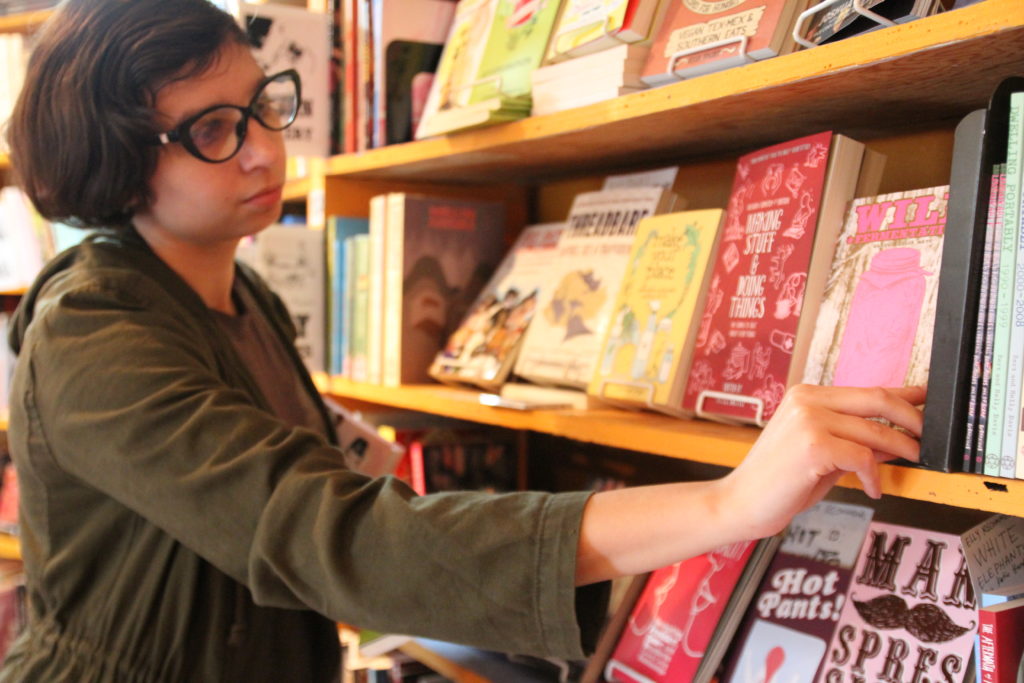 In August 2012, the organization split into two separate organizations.
In August 2012, the organization split into two separate organizations.
The collective had managed the organization from 2006-2012 but it clearly wasn’t working. We spent the next two years paying off tens of thousands of dollars in debts created by the collective management. To prevent the cycle of further intense feelings of burn out and frustration, I made an immediate effort to work towards doubling wages and looking long and hard at our finances on how to get things back on track. Microcosm continues to operate like a non-profit, dividing all money beyond production expenses into the wages of all staff and by April 2015 the entire staff’s wages will be doubled from what they were in January of 2013. We had a major organizational re-founding, creating a culture of conflict resolution and acceptance. Being aware of and sensitive to what was going on in the staff’s lives became much easier once everyone was working under the same roof and communicating. The emotional landscape gradually relaxed and people’s morale spiked and they did their jobs with a hungry fervor once again. Our visions can push us to where we each want to go and not have to get approval from half a dozen people of various levels of investment.
I’m embarrassed about plenty of things that I’ve done and regret plenty more, but I would recommend years of intensive therapy to anyone who hasn’t done it. It is like magic to walk through your life without carrying around decades of baggage and make conscious decisions for yourself without voices of doubt guiding you. As a result, since February of 2009, I’ve been in what my partner (whom has repeatedly expressed that she finds nothing resembling anything like what I’ve been accused of present in our life now) and I both describe as a happy and healthy relationship. The Microcosm staff has gone through a major culture change and morale boost. People express their problems or concerns and they are resolved.
I still make mistakes and do or say things that come across as callous, but I feel like it’s been reduced by 95% and I found a balance that isn’t totally crippling to my functionality. At work now, the vast majority of our staff are purposefully people who are not neurotypical. This is for two reasons: One, I communicate best with people like this and relate much better with them without long, involved conversations. Two, these are the kinds of people who, like me, have a hard time navigating communication with most people and it causes a lot of pain that we can avoid by clustering together. And also, it breeds trust because they can relate to the experience of being afraid of hurting someone else through accidentally saying something hurtful and so trust goes both ways. It’s easier to have empathy.
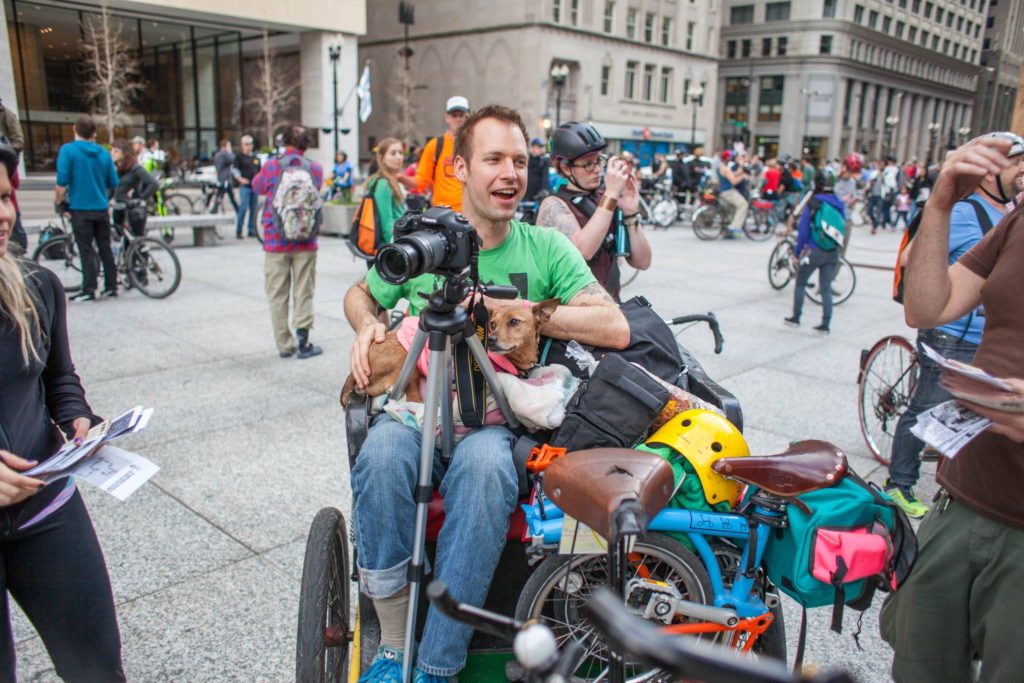 But Microcosm ran into one more hurdle. In return for getting half of the inventory, a website, and rights to sell the stuff that we get shipped ready-made from the publisher, Jessie Duke’s new company, Pioneers Press became responsible for half of the current debt load for June and July of 2012 that wasn’t paid for by cash flow during those months. So, in return for roughly $20,000, she received equipment and inventory worth over $100,000. She had been running the company for the last few years, had a good handle on it, and had significantly taken and suggested pay cuts to pay off old debt, which she finished paying off in June of 2012. So it was only current debt that needed paid off.
But Microcosm ran into one more hurdle. In return for getting half of the inventory, a website, and rights to sell the stuff that we get shipped ready-made from the publisher, Jessie Duke’s new company, Pioneers Press became responsible for half of the current debt load for June and July of 2012 that wasn’t paid for by cash flow during those months. So, in return for roughly $20,000, she received equipment and inventory worth over $100,000. She had been running the company for the last few years, had a good handle on it, and had significantly taken and suggested pay cuts to pay off old debt, which she finished paying off in June of 2012. So it was only current debt that needed paid off.
Unfortunately, despite having a new title by our bestselling author, those two months were terrible for sales. We were sent an “Open Letter to Microcosm” that wasn’t based in fact for either of us at the time and while well-intentioned, wasn’t written by anyone who had any kind of direct contact or experience with any of us. It hurt sales when we were desperately trying to pay off debts and then when she launched her own company, she had a hard time starting out. Further, the staff that was moving to form Pioneers were focused on their new job duties while there was still work needed for the transition by raising the necessary funds. Jessie was still getting a lot of criticism for having worked closely with me for many years and I think people saw it as an opportunity to demand that she take a stand publicly against me, now that she had given me back management of Microcosm. Our fans were frustrated and confused with a high volume of seemingly mixed messages that had come from the collective. The staff of Pioneers, while working at and running Microcosm, had issued a series of statements and promises that the public did not feel were carried out to their satisfaction.
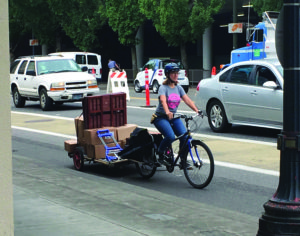 People were really attacking Jessie in public and she has a really hard time with that. I tried to be supportive, but she was not paying anything on the debts she had committed to pay off that were on my personal credit card. And within six months it went from “Sorry, I can’t afford it this month” to “I’m not going to pay you.” She had been very supportive of me for years through the worst times of my life and it really hurt when she sent me the “I can’t do this anymore” message. Ugh. I was patient for 18 months but it was wrecking Microcosm. I had to get second and third jobs to keep the credit card bills under control. She was callous about it and was clearly upset. I hope it was something more than the money because that’s more heartbreaking, you know?
People were really attacking Jessie in public and she has a really hard time with that. I tried to be supportive, but she was not paying anything on the debts she had committed to pay off that were on my personal credit card. And within six months it went from “Sorry, I can’t afford it this month” to “I’m not going to pay you.” She had been very supportive of me for years through the worst times of my life and it really hurt when she sent me the “I can’t do this anymore” message. Ugh. I was patient for 18 months but it was wrecking Microcosm. I had to get second and third jobs to keep the credit card bills under control. She was callous about it and was clearly upset. I hope it was something more than the money because that’s more heartbreaking, you know?
Seriously struggling to cover the same huge credit card bills with half of much money coming in, we asked if they could pay at least $100/month, so we could at least see motion on it, and they refused. More than anything, it was frustrating that our friends had left us in a lurch. Fifteen months later, we reluctantly filed a lawsuit against our former co-workers who still owe Microcosm tens of thousands of dollars. (https://microcosmpublishing.com/blogifesto/2013/11/microcosm-publishing-microcosm-distribution-and-pioneers-press-1)
In many ways, the saddest thing is that my community—the only loving family that I’ve ever known—failed me. People who had been invested in the situation weren’t interested in resolving the problem. When I told people that I had been bullied for over twelve years by strangers on the Internet because of the way that my ex-wife depicts our abusive relationship that deny my experience and pushed me until I was suicidal, I get a reaction similar to the one when I was five and told neighbors that my mother beat me. They find every reason to look the other way or worse, try to justify the behavior. People had surrounded themselves with such a brackish cloud of confusing misinformation that they couldn’t see the space between two seemingly conflicting perspectives.
Two co-workers told me that they had met Austistic people before and that I wasn’t one. I had taken legal action exactly once in my life. When I turned Microcosm into a collective we had $40,000 in savings. After a year I said that if they didn’t start paying at least $100 per month, I would take legal action as that amount of debt was crippling and I had to get second and third jobs to pay it off. Still, I regret it. I was hurt because these were people that I had worked with for years and trusted with hundreds of thousands of dollars worth of inventory and equipment to pay their half of the debt. It was hugely discouraging.
One of the few comforts of the legal system, unlike the radical community, is that it gets the facts on the table and involves a fact-checking process. When I’ve mentioned how the “accountability group” approached my situation with intense bias, spent their effort yelling at people who were trying to help, and had agreements that they did not disclose to me, I was told that I don’t have a right to fairness or restorative justice. That conservative attitude makes the legal system seem downright radical in comparison. But we’ve found that it’s also very slow, very expensive, and not designed to benefit people in situations like ours. How does one resolve a situation where they are owed five figures? We may never know and there may be no good answer.
 There is a culture of fear and didactic politics around the left’s still largely undefined “accountability” practices. Our communities don’t know how to conduct them, let alone how to heal and move on afterwards. That is why Microcosm has made continual efforts to publish works about how to identify and develop healthy relationships, as well as navigating a continued investment to producing resources that help people to understand and negotiate power structures and conflict resolution, to reduce the continual application of sandpaper on everyone’s wounds. Our story has no shortage of tumult and I’ve certainly done things I regret, but it’s promising and exciting that we are in a position where we can move forward and offer insight and resources based on our experiences to help others.
There is a culture of fear and didactic politics around the left’s still largely undefined “accountability” practices. Our communities don’t know how to conduct them, let alone how to heal and move on afterwards. That is why Microcosm has made continual efforts to publish works about how to identify and develop healthy relationships, as well as navigating a continued investment to producing resources that help people to understand and negotiate power structures and conflict resolution, to reduce the continual application of sandpaper on everyone’s wounds. Our story has no shortage of tumult and I’ve certainly done things I regret, but it’s promising and exciting that we are in a position where we can move forward and offer insight and resources based on our experiences to help others.
Joe has since published a book about his life growing up and not knowing that he was autistic.
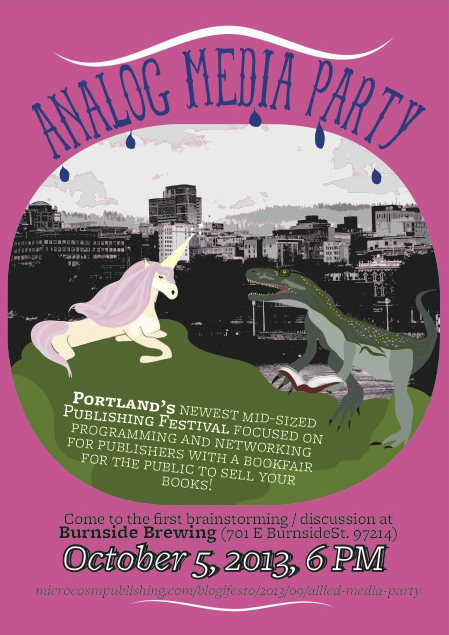 We had a really stellar first meeting for the Analog Media Party this month after Wordstock!
We had a really stellar first meeting for the Analog Media Party this month after Wordstock!



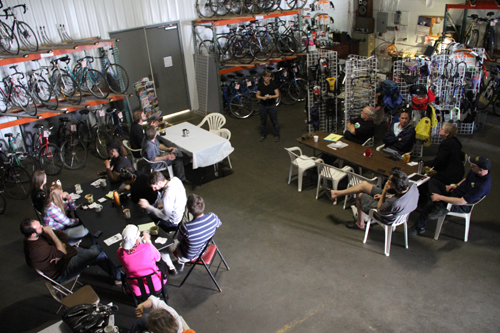




















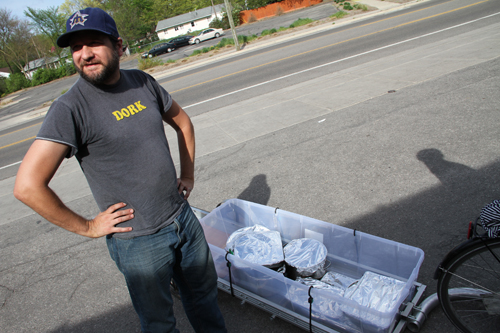

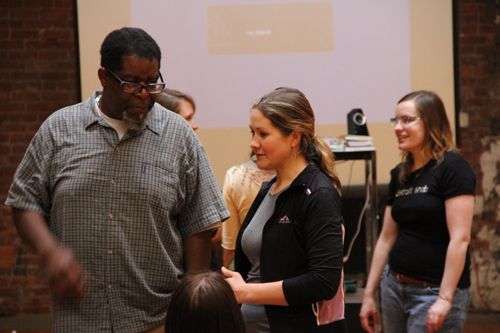
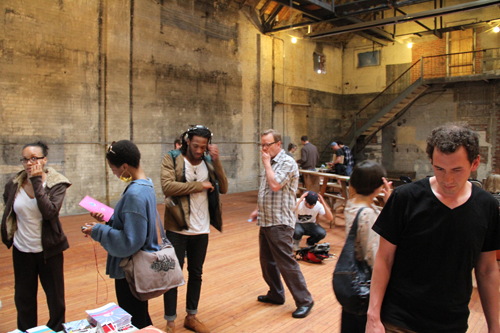
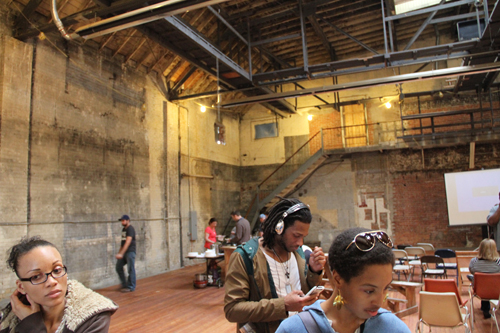

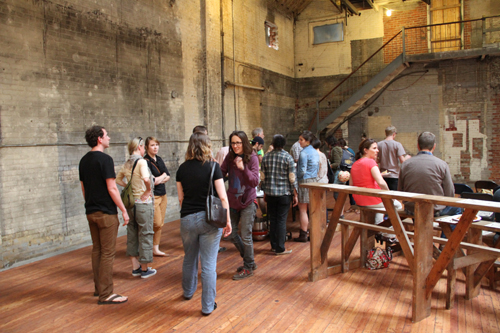
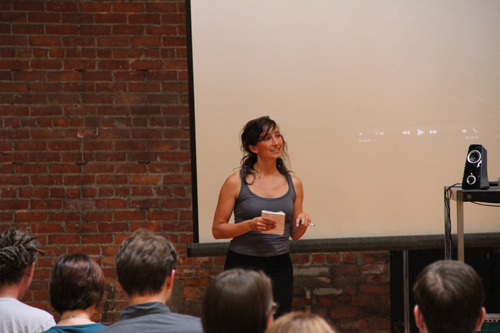
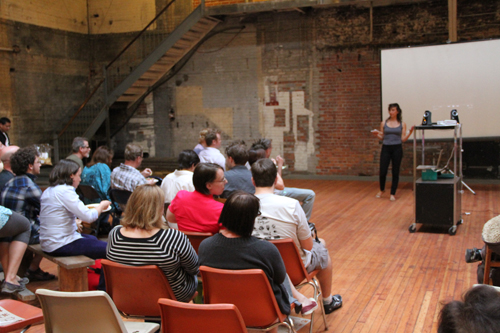
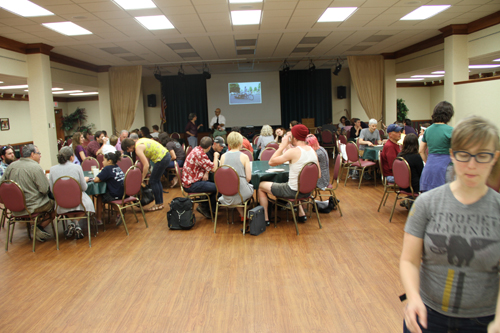
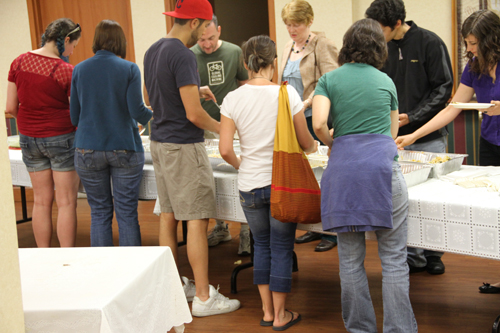
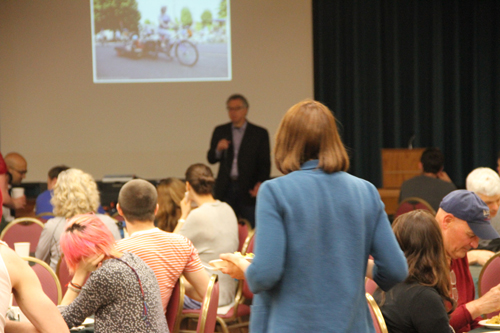
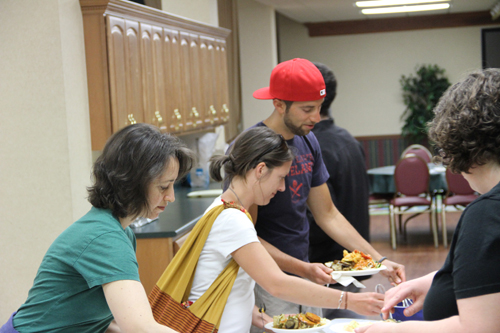
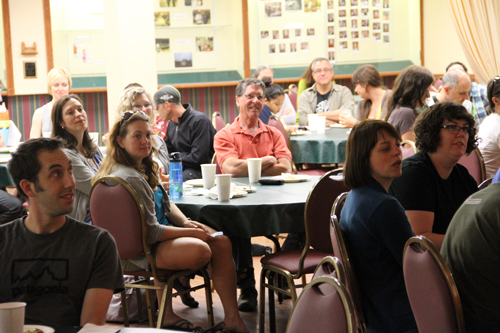

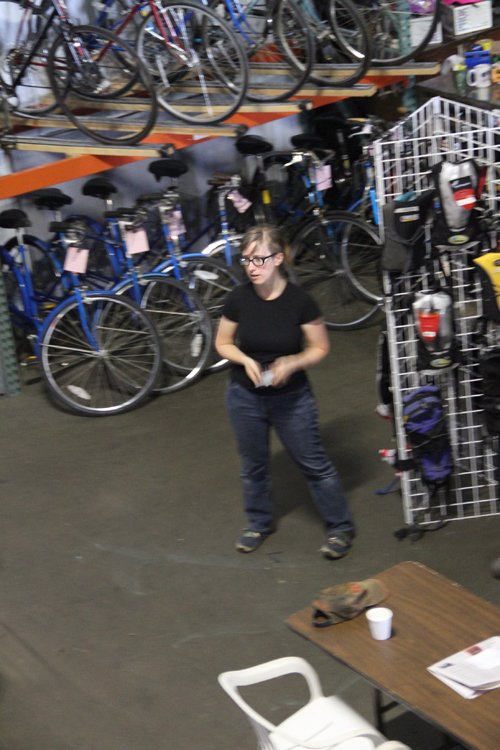
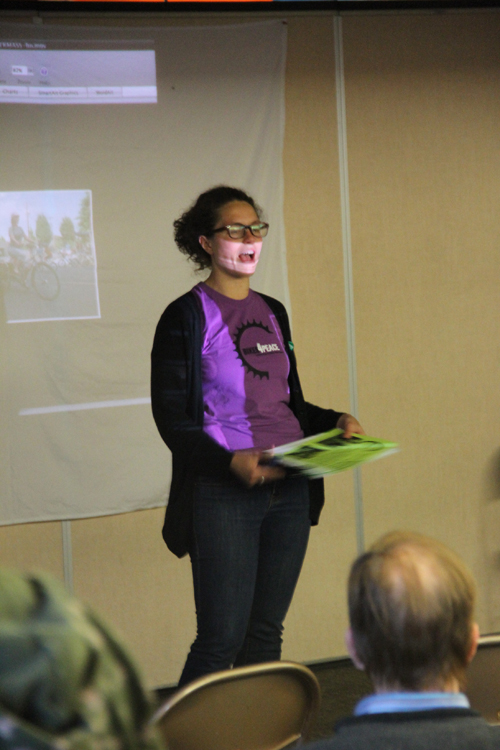
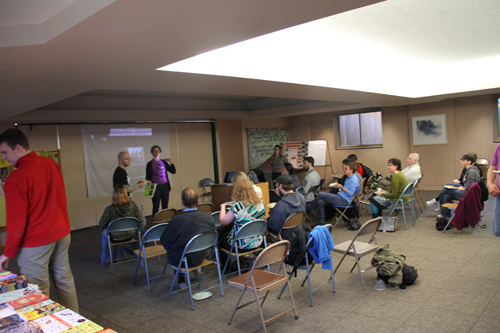
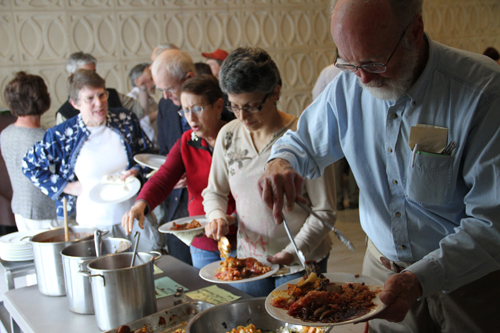
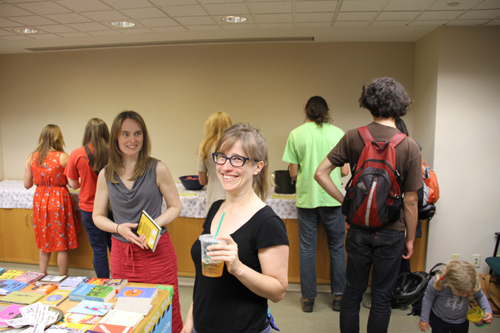
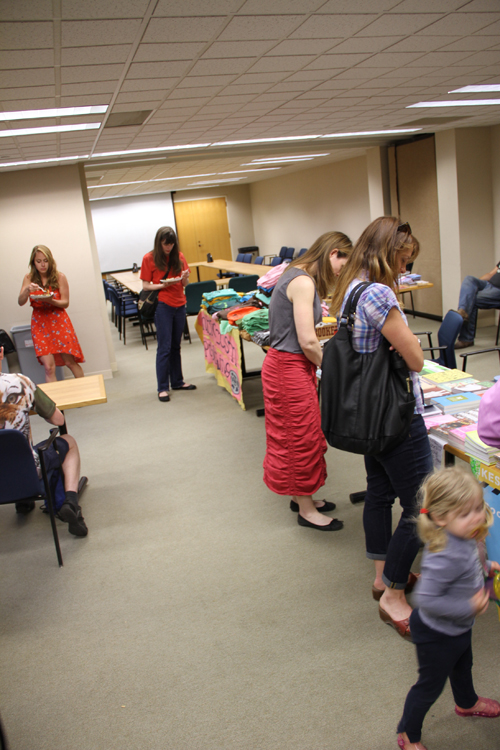
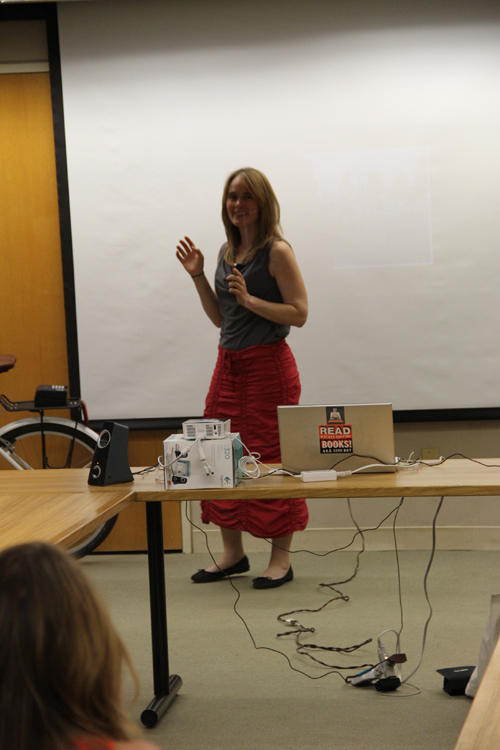
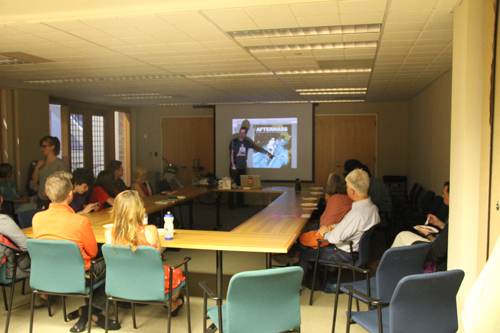
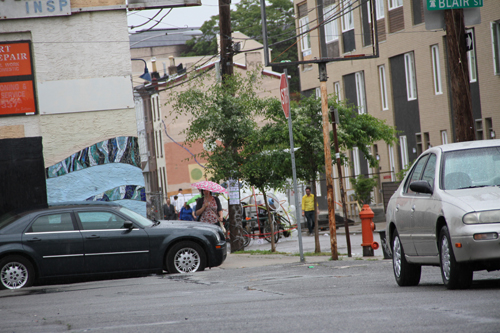
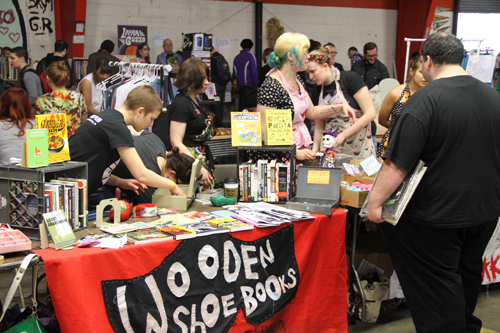

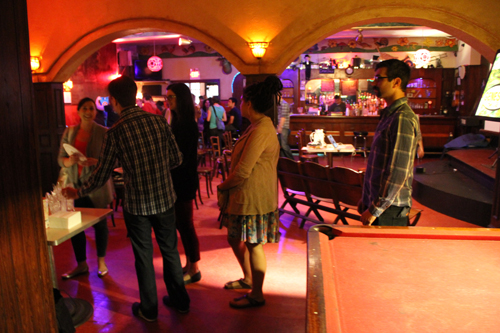
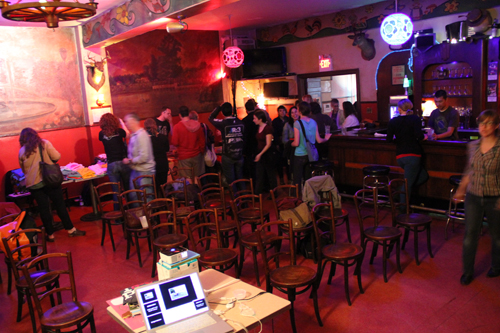
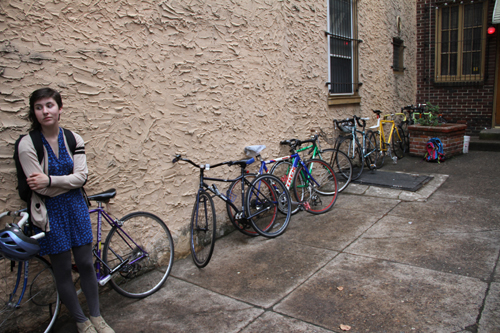
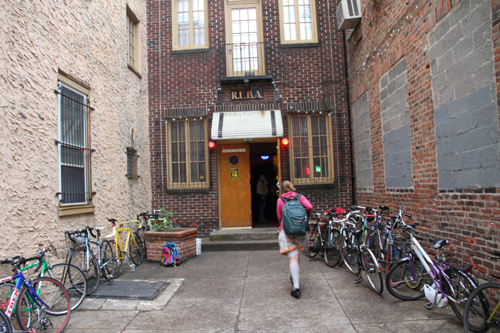
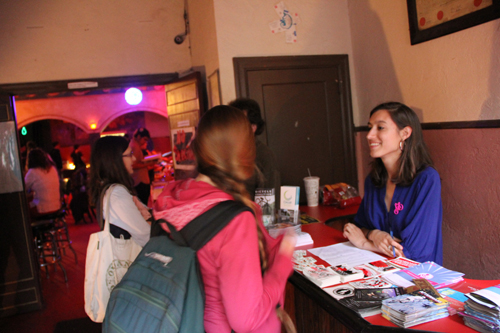
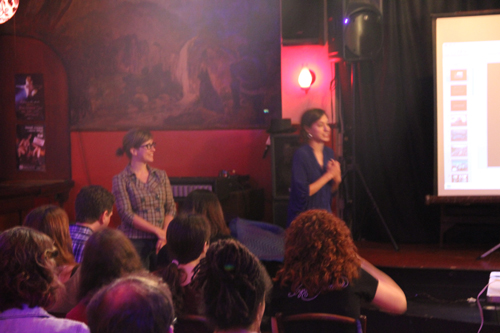
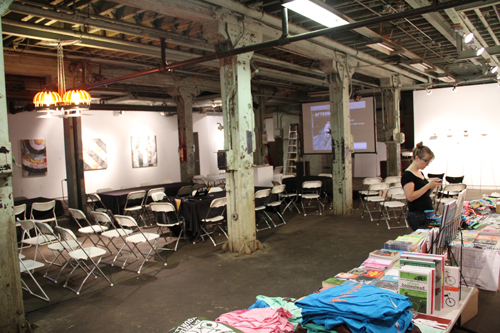
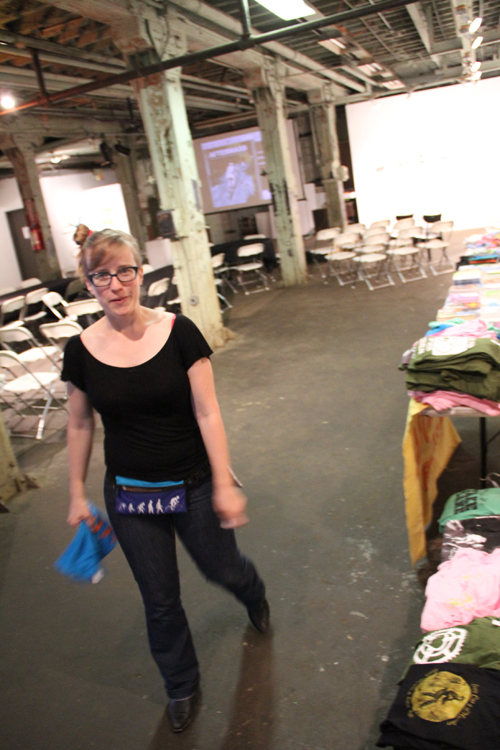
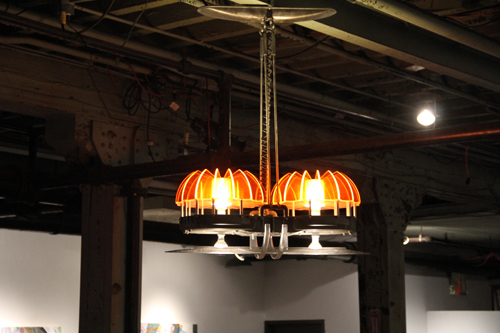
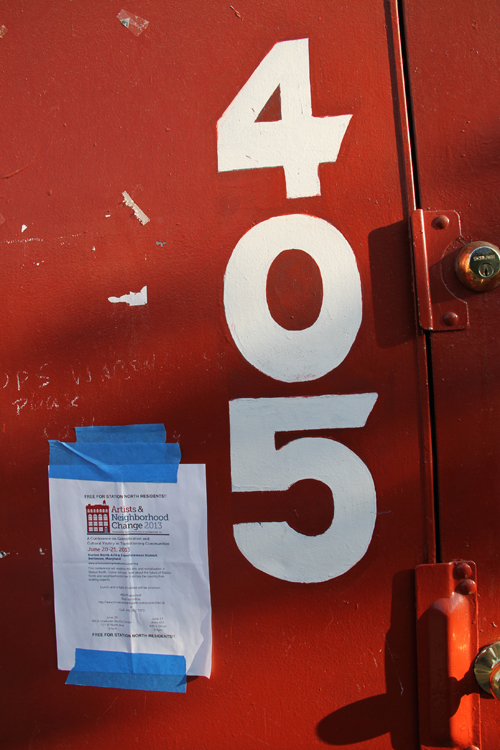
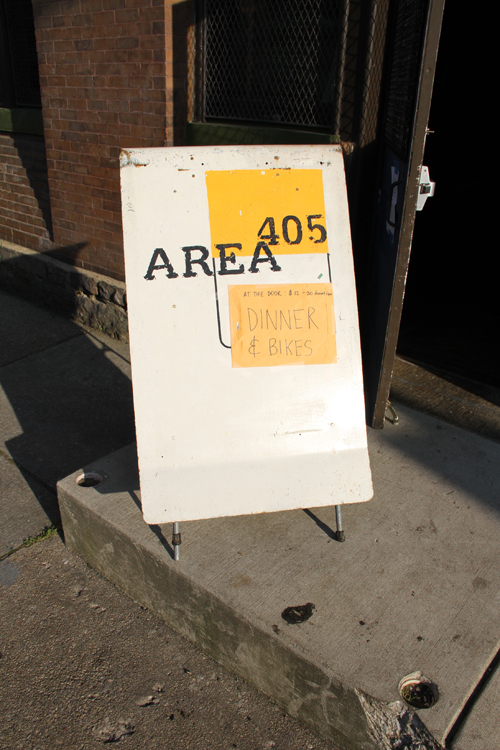
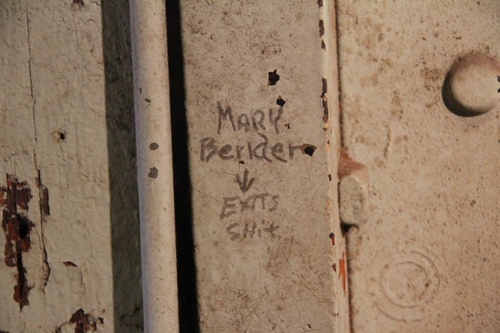
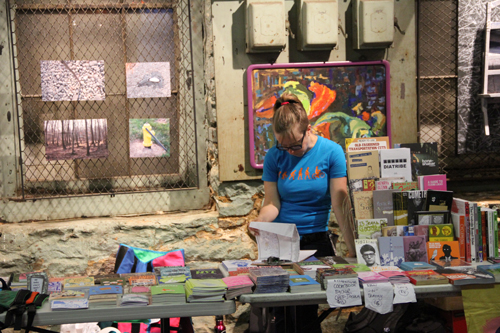
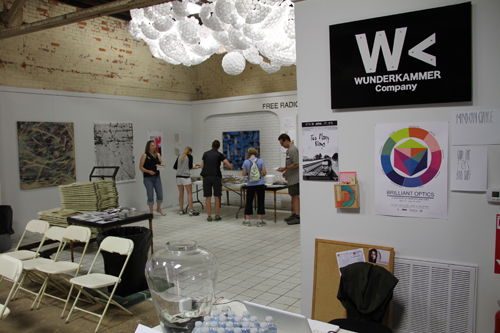
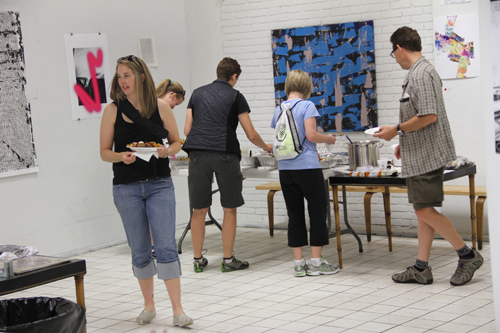
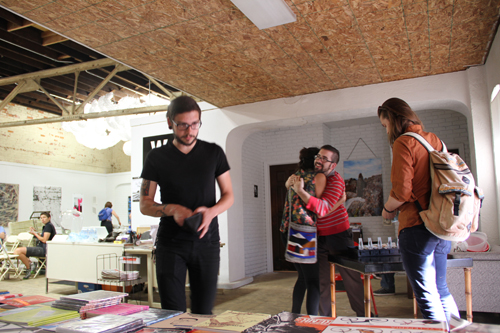
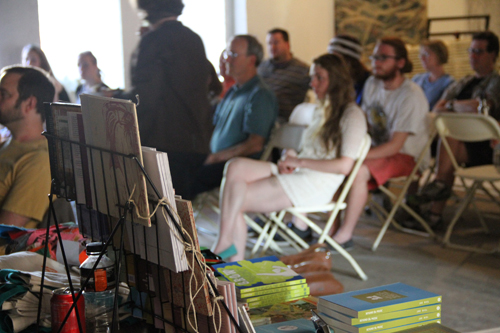
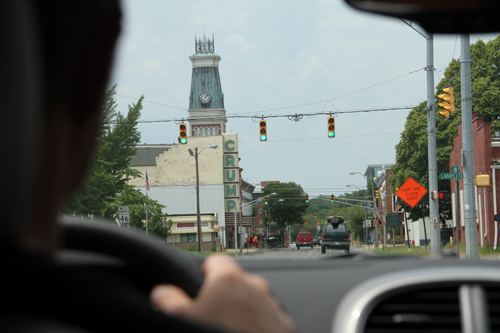

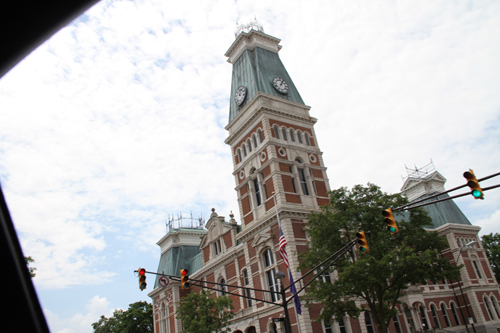
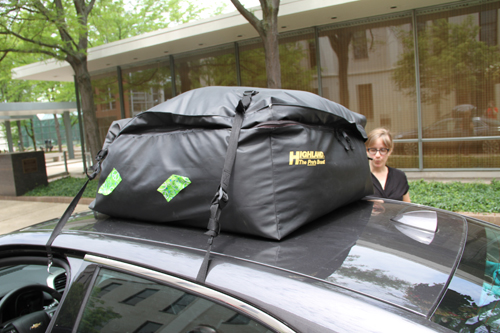
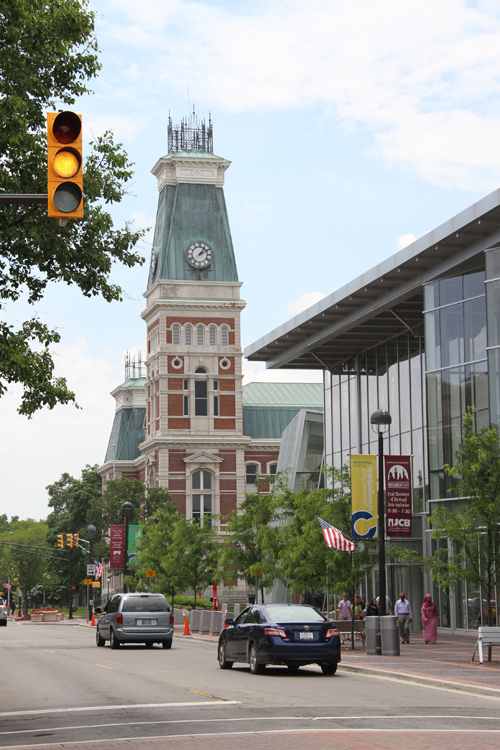
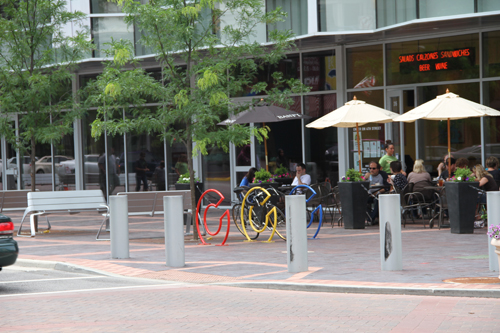
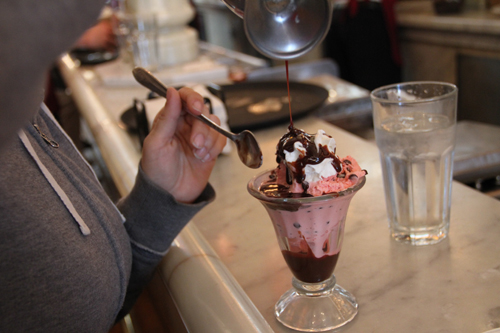
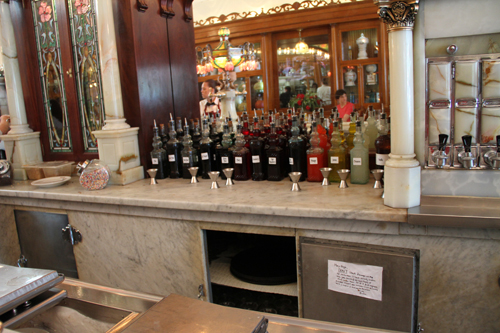

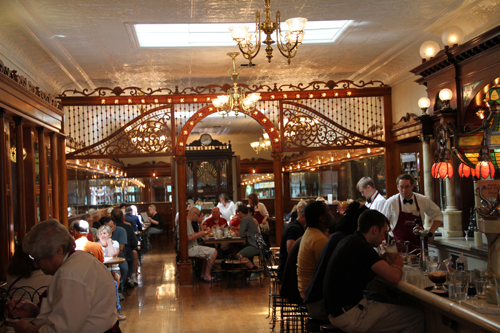
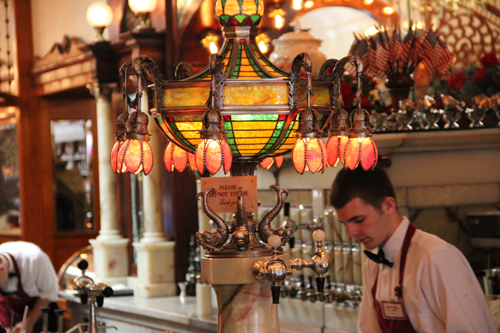
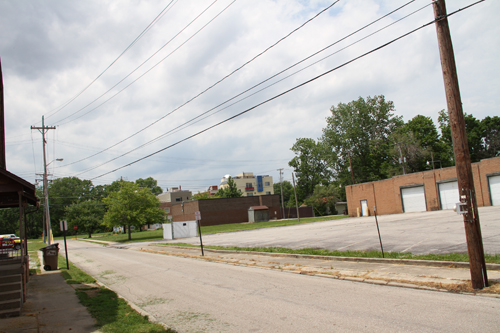
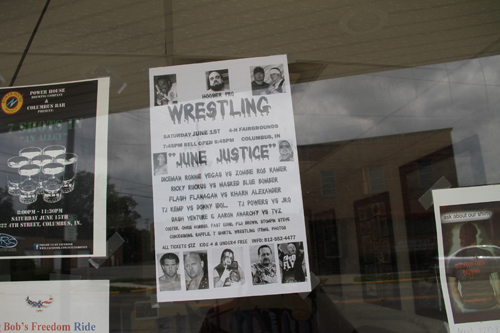
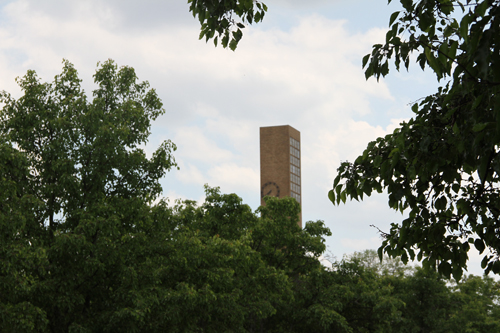
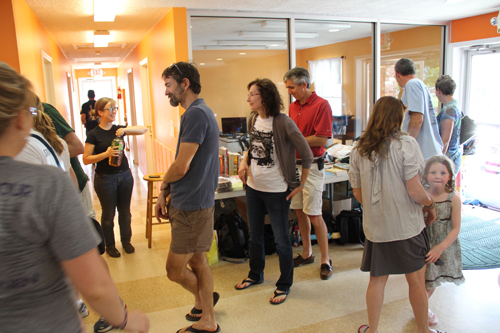
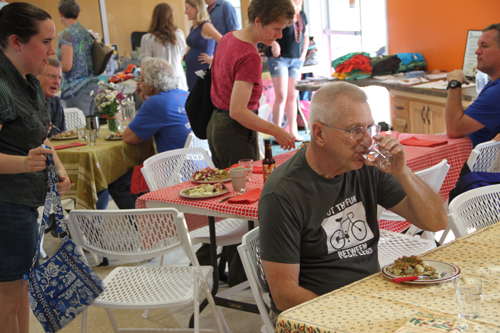
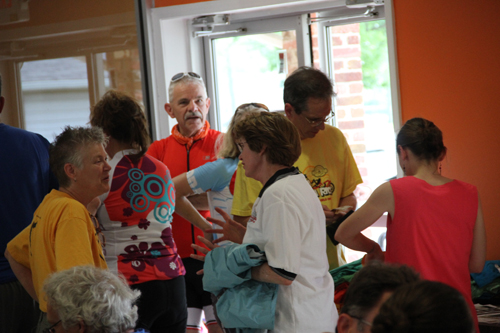
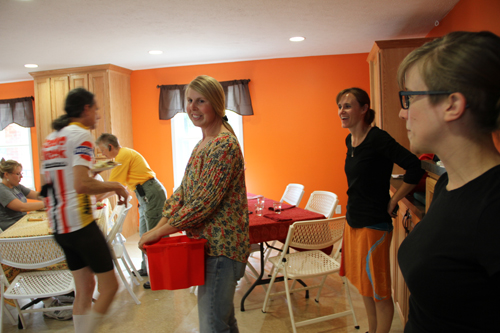
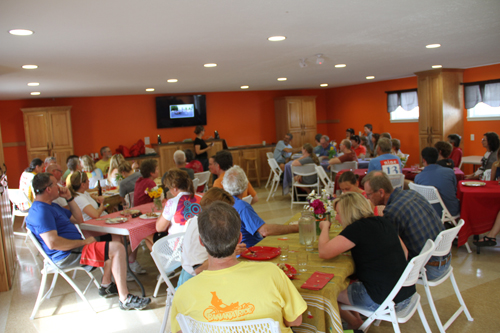
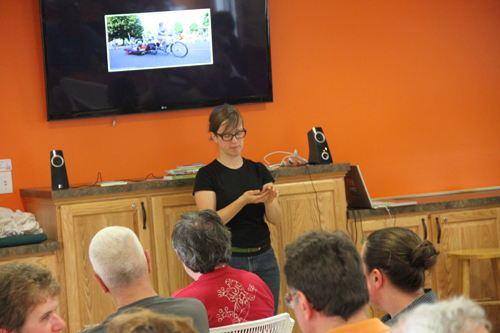
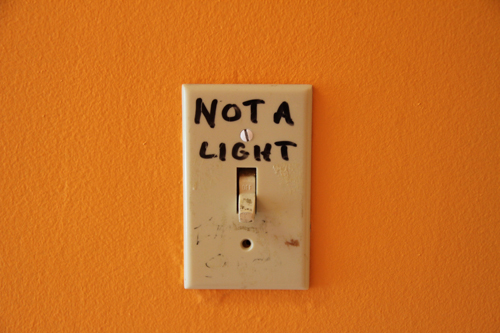

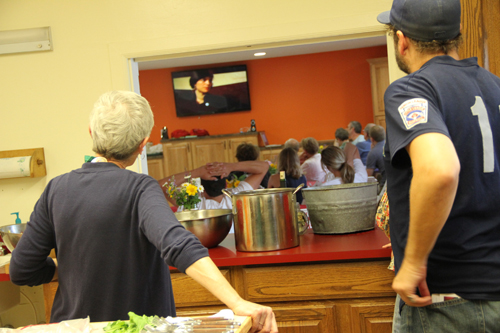
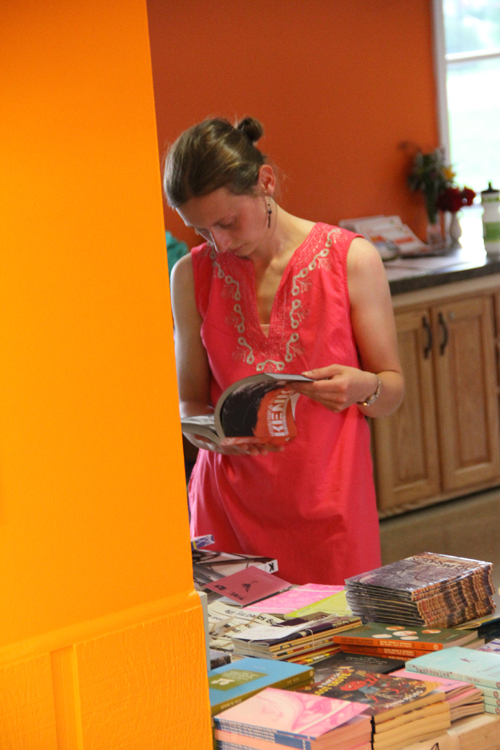
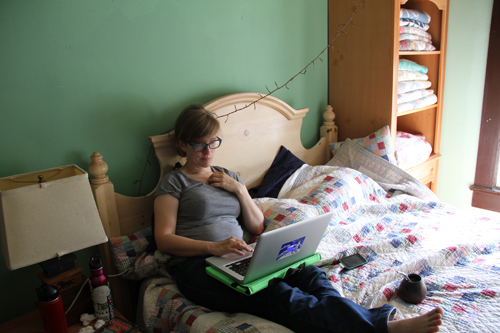
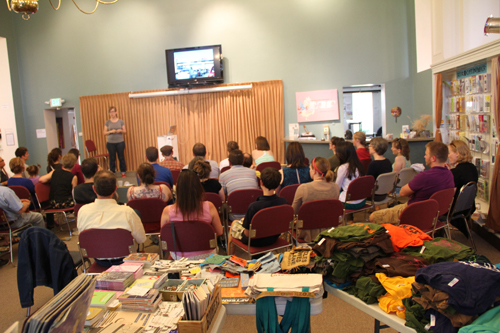
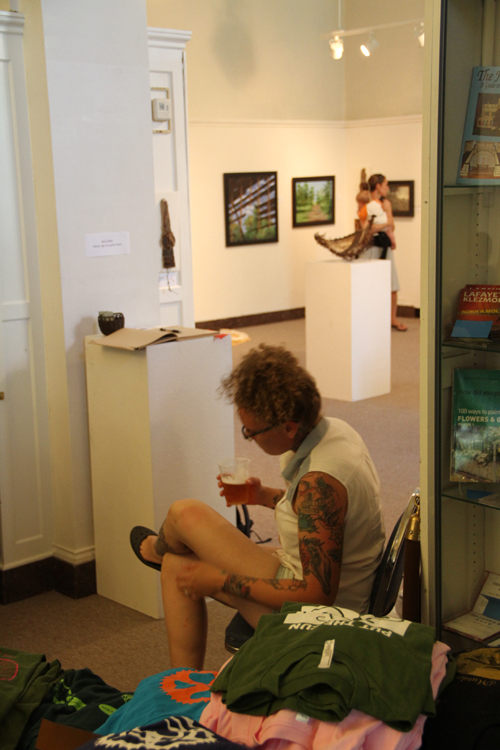
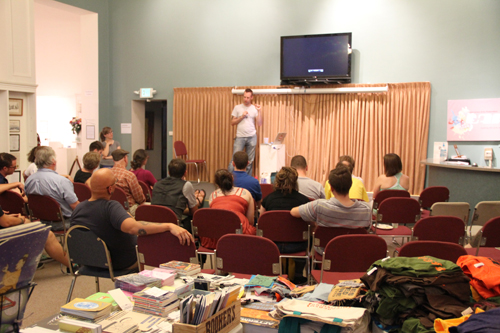
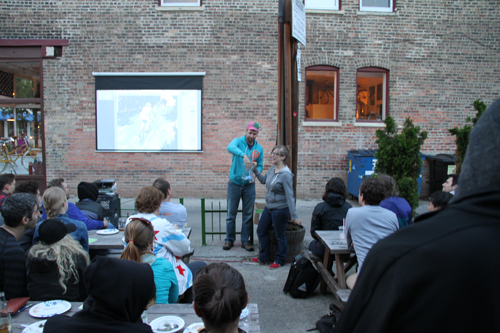
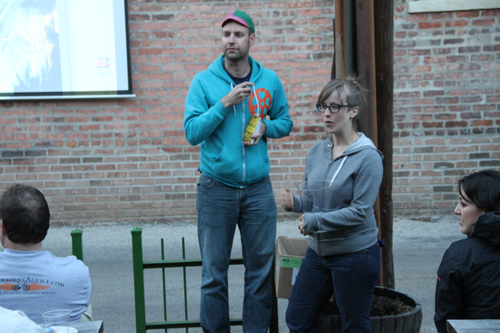
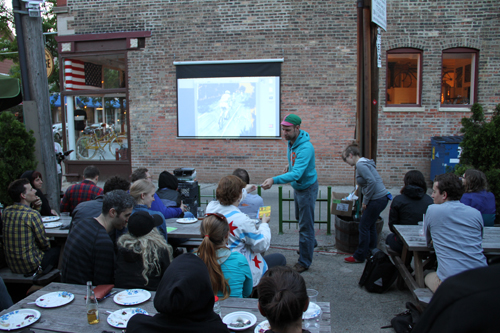
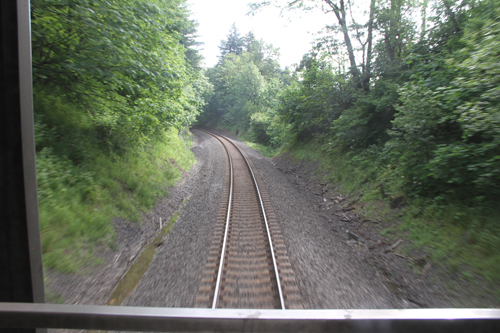


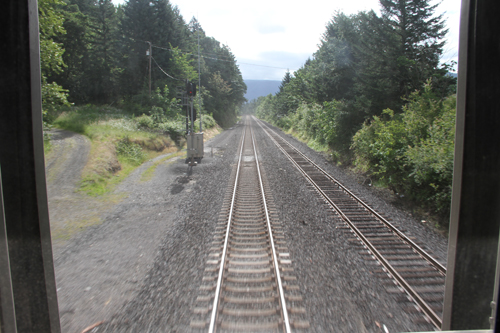

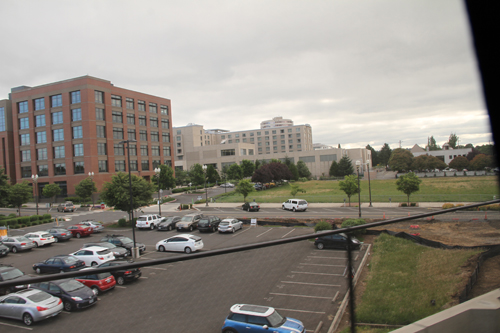
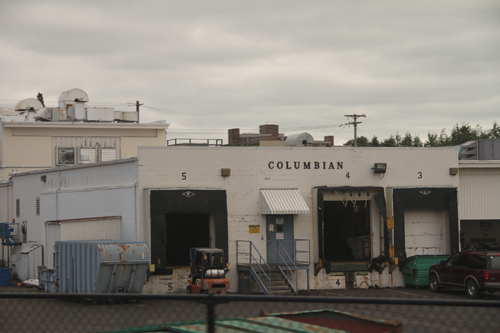
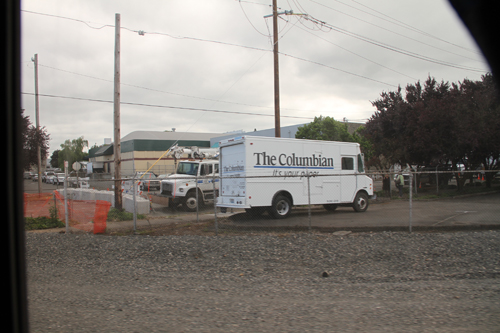
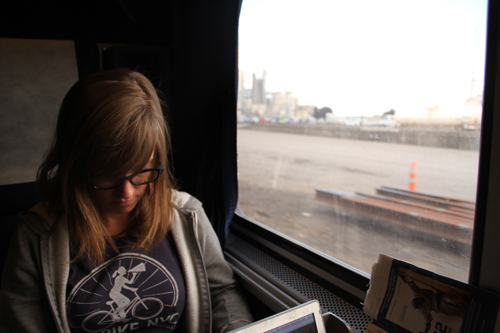
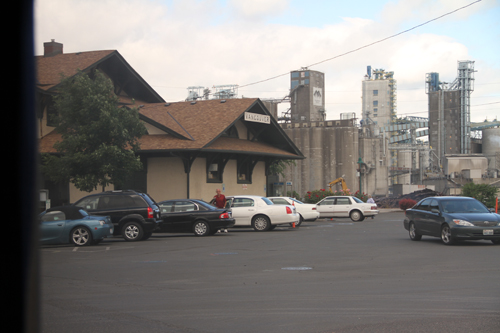

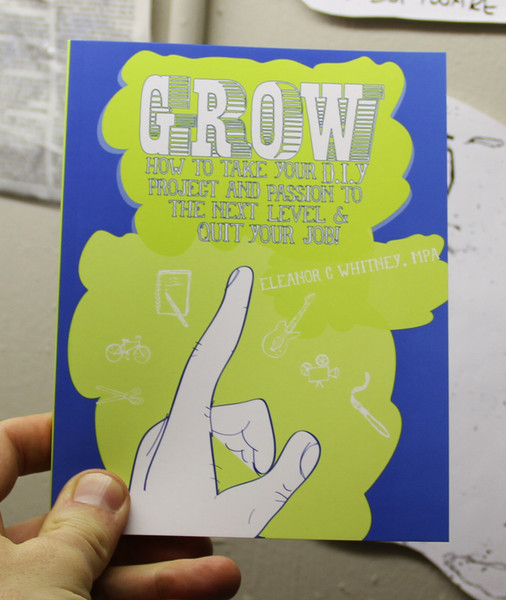 Grow: How to take your do it yourself project and passion to the next level and quit your job! is a practical field guide for creative people to achieve success and sustainability on their own terms. Part of Grow’s mission is to empower creative people to come up with innovative solutions to make their creative passions sustainable career options. The first step in that process is to assess where you are and define where you want to go. In the spirit of Grow I posed a series of questions to Meggyn Pomerleau, who designed the book, about her career and goals so far. The issues that Meggyn outlines in our conversation are the ones that inspired me to write Grow: How to balance your creative passion with “real life,” how to understand what you and your creative work is worth, and how to face down an uncertain future with a careful planning.
Grow: How to take your do it yourself project and passion to the next level and quit your job! is a practical field guide for creative people to achieve success and sustainability on their own terms. Part of Grow’s mission is to empower creative people to come up with innovative solutions to make their creative passions sustainable career options. The first step in that process is to assess where you are and define where you want to go. In the spirit of Grow I posed a series of questions to Meggyn Pomerleau, who designed the book, about her career and goals so far. The issues that Meggyn outlines in our conversation are the ones that inspired me to write Grow: How to balance your creative passion with “real life,” how to understand what you and your creative work is worth, and how to face down an uncertain future with a careful planning.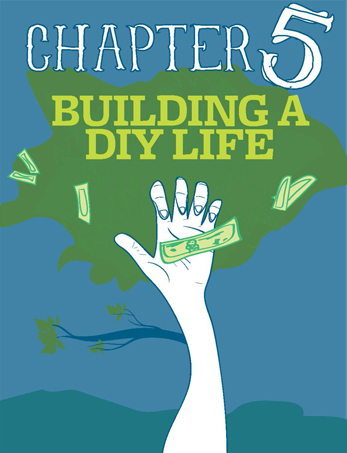 – My life is design, despite having the office job. I dream about typography; I pay attention to advertisements and details in logos, banners, and posters; and I’m constantly brainstorming pieces in my head. If I had to break it down in numbers: 40% of my life is the non-creative office job, 25% is actually creating, and 35% is everything else.
– My life is design, despite having the office job. I dream about typography; I pay attention to advertisements and details in logos, banners, and posters; and I’m constantly brainstorming pieces in my head. If I had to break it down in numbers: 40% of my life is the non-creative office job, 25% is actually creating, and 35% is everything else. 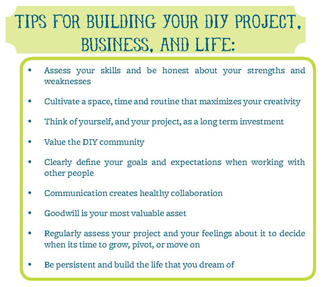


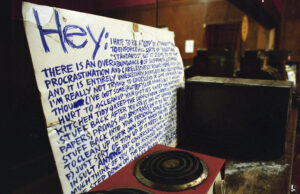 Do you find out interesting nuggets by talking to those who came before you or by scouting out details on Google and Wikipedia? Do you want a reason to hunt out some people you respect and fill in the gaps?
Do you find out interesting nuggets by talking to those who came before you or by scouting out details on Google and Wikipedia? Do you want a reason to hunt out some people you respect and fill in the gaps? Joe Biel
Joe Biel After being involved in the many various incarnations of Microcosm over the past nineteen years, my tastes and interests changed and sometimes weren’t in sync with the scene’s, the Microcosm collective’s, the organization itself, or the sort of cultural groupthink that was happening around us. One major problem of creating something as a teenager without much forethought is that we were progressively aging out of the youth culture that our fans existed in; the organization couldn’t evolve as fast as it needed to for my own interest. So at various points where I felt particularly out of sync, I would disinvest from Microcosm and try to give other people more room in their vision of how to shape it.
After being involved in the many various incarnations of Microcosm over the past nineteen years, my tastes and interests changed and sometimes weren’t in sync with the scene’s, the Microcosm collective’s, the organization itself, or the sort of cultural groupthink that was happening around us. One major problem of creating something as a teenager without much forethought is that we were progressively aging out of the youth culture that our fans existed in; the organization couldn’t evolve as fast as it needed to for my own interest. So at various points where I felt particularly out of sync, I would disinvest from Microcosm and try to give other people more room in their vision of how to shape it. Also starting in 2006, before the bulk of our warehousing was handled by Independent Publisher’s Group, Microcosm set out on an ongoing quest to find affordable warehousing for the volume of publishing it was doing inside inner-Portland. Unable to do so, we instead setup a mail-order and warehouse location in Bloomington, IN in March 2007. This confused a lot of people, who felt that we had “moved out of Portland” even though we still had people and a presence there. Nonetheless, I think people took it as the first “betrayal.” Our fans felt ownership over Microcosm, which made hard decisions even more difficult. Other staff, who interpreted this as a free invitation to move wherever they wanted and keep their jobs, setup an office for promotions in Lansing, Kansas in 2011. Further, due to complications of communication and managing across state lines, all three locations become somewhat fractured from each other and developed tension. Conversations about the simplest things became overly complicated. The overworked staff were frustrated with each other due to distance and perception.The decisions that management was making were causing wages to sink lower each year.
Also starting in 2006, before the bulk of our warehousing was handled by Independent Publisher’s Group, Microcosm set out on an ongoing quest to find affordable warehousing for the volume of publishing it was doing inside inner-Portland. Unable to do so, we instead setup a mail-order and warehouse location in Bloomington, IN in March 2007. This confused a lot of people, who felt that we had “moved out of Portland” even though we still had people and a presence there. Nonetheless, I think people took it as the first “betrayal.” Our fans felt ownership over Microcosm, which made hard decisions even more difficult. Other staff, who interpreted this as a free invitation to move wherever they wanted and keep their jobs, setup an office for promotions in Lansing, Kansas in 2011. Further, due to complications of communication and managing across state lines, all three locations become somewhat fractured from each other and developed tension. Conversations about the simplest things became overly complicated. The overworked staff were frustrated with each other due to distance and perception.The decisions that management was making were causing wages to sink lower each year. Simultaneously, there was understandable friction that I got the credit when we did something right, even if I had little to do with it. People wanted to interview me, rather than the collective. So there were increasing efforts to make it appear like more of a semi-anonymous group that projected an amorphous image. And I think to the public, it created a lot of confusion because we didn’t seem to act consistently or with forethought. Instead of pursuing a vision we were following watered-down decision making: Actions were taken once a decision was shaped to no longer be objectionable to any member of the collective, rather than making planned out choices set out to achieve specific goals.
Simultaneously, there was understandable friction that I got the credit when we did something right, even if I had little to do with it. People wanted to interview me, rather than the collective. So there were increasing efforts to make it appear like more of a semi-anonymous group that projected an amorphous image. And I think to the public, it created a lot of confusion because we didn’t seem to act consistently or with forethought. Instead of pursuing a vision we were following watered-down decision making: Actions were taken once a decision was shaped to no longer be objectionable to any member of the collective, rather than making planned out choices set out to achieve specific goals.
 Mediation was further attempted by other individuals but once people saw that the situation was complex and not just black and white, they would back away and say they didn’t have time to deal with it, creating more chaos and rumors. Unfortunately, the vast majority of questions from people following the
Mediation was further attempted by other individuals but once people saw that the situation was complex and not just black and white, they would back away and say they didn’t have time to deal with it, creating more chaos and rumors. Unfortunately, the vast majority of questions from people following the  Simultaneously, my experience and vision could be frustrating and intimidating to people at work who had less of either and desperately wanted to be equals or simply had incompatible visions with the other staff. The whole thing was stressing us all out something fierce.From all points, the staff was really burnt out on it and our fans were bringing the conflict they perceived up to the staff—mostly Jessie—for so many years that it just caused the staff shut to down for awhile. I was fed up and began my exit strategy.
Simultaneously, my experience and vision could be frustrating and intimidating to people at work who had less of either and desperately wanted to be equals or simply had incompatible visions with the other staff. The whole thing was stressing us all out something fierce.From all points, the staff was really burnt out on it and our fans were bringing the conflict they perceived up to the staff—mostly Jessie—for so many years that it just caused the staff shut to down for awhile. I was fed up and began my exit strategy. I created a new press called Cantankerous and started having successes with things outside of Microcosm, which was certainly a wake-up call. We built a touring package that I’m really proud of with
I created a new press called Cantankerous and started having successes with things outside of Microcosm, which was certainly a wake-up call. We built a touring package that I’m really proud of with  In August 2012, the organization
In August 2012, the organization  But Microcosm ran into one more hurdle. In return for getting half of the inventory, a website, and rights to sell the stuff that we get shipped ready-made from the publisher, Jessie Duke’s new company, Pioneers Press became responsible for half of the current debt load for June and July of 2012 that wasn’t paid for by cash flow during those months. So, in return for roughly $20,000, she received equipment and inventory worth over $100,000. She had been running the company for the last few years, had a good handle on it, and had significantly taken and suggested pay cuts to pay off old debt, which she finished paying off in June of 2012. So it was only current debt that needed paid off.
But Microcosm ran into one more hurdle. In return for getting half of the inventory, a website, and rights to sell the stuff that we get shipped ready-made from the publisher, Jessie Duke’s new company, Pioneers Press became responsible for half of the current debt load for June and July of 2012 that wasn’t paid for by cash flow during those months. So, in return for roughly $20,000, she received equipment and inventory worth over $100,000. She had been running the company for the last few years, had a good handle on it, and had significantly taken and suggested pay cuts to pay off old debt, which she finished paying off in June of 2012. So it was only current debt that needed paid off. People were really attacking Jessie in public and she has a really hard time with that. I tried to be supportive, but she was not paying anything on the debts she had committed to pay off that were on my personal credit card. And within six months it went from “Sorry, I can’t afford it this month” to “I’m not going to pay you.” She had been very supportive of me for years through the worst times of my life and it really hurt when she sent me the “I can’t do this anymore” message. Ugh. I was patient for 18 months but it was wrecking Microcosm. I had to get second and third jobs to keep the credit card bills under control. She was callous about it and was clearly upset. I hope it was something more than the money because that’s more heartbreaking, you know?
People were really attacking Jessie in public and she has a really hard time with that. I tried to be supportive, but she was not paying anything on the debts she had committed to pay off that were on my personal credit card. And within six months it went from “Sorry, I can’t afford it this month” to “I’m not going to pay you.” She had been very supportive of me for years through the worst times of my life and it really hurt when she sent me the “I can’t do this anymore” message. Ugh. I was patient for 18 months but it was wrecking Microcosm. I had to get second and third jobs to keep the credit card bills under control. She was callous about it and was clearly upset. I hope it was something more than the money because that’s more heartbreaking, you know? There is a culture of fear and didactic politics around the left’s still largely undefined “accountability” practices. Our communities don’t know how to conduct them, let alone how to heal and move on afterwards. That is why Microcosm has made continual efforts to publish works about how to identify and develop healthy relationships, as well as navigating a continued investment to producing resources that help people to understand and negotiate power structures and conflict resolution, to reduce the continual application of sandpaper on everyone’s wounds. Our story has no shortage of tumult and I’ve certainly done things I regret, but it’s promising and exciting that we are in a position where we can move forward and offer insight and resources based on our experiences to help others.
There is a culture of fear and didactic politics around the left’s still largely undefined “accountability” practices. Our communities don’t know how to conduct them, let alone how to heal and move on afterwards. That is why Microcosm has made continual efforts to publish works about how to identify and develop healthy relationships, as well as navigating a continued investment to producing resources that help people to understand and negotiate power structures and conflict resolution, to reduce the continual application of sandpaper on everyone’s wounds. Our story has no shortage of tumult and I’ve certainly done things I regret, but it’s promising and exciting that we are in a position where we can move forward and offer insight and resources based on our experiences to help others.